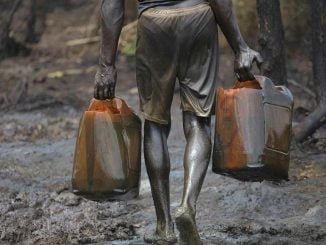Kampala, Uganda | URN | A court in France has dismissed a case brought against TotalEnergies by activists who sought to halt oil and gas development activities in Uganda.
The six Non-Governmental Organizations (NGOs) claimed that the projects being implemented by the energy company in Uganda and Tanzania violated the human rights of the people and threatened the environment there.
In making its ruling on Tuesday 28, February 2023, the court accused the group of shifting positions during proceedings. The court said the applicants presented claims during a December court hearing that were “substantially different” from those made in 2019 when the initial lawsuit was filed.
The French oil giant together with China National Offshore Oil Company is developing the Tilenga and Kingfisher oil and gas projects respectively in western Uganda and a 1,443 km crude export pipeline from the fields to the Indian Ocean coast of Tanzania.
The group had alleged that the French oil giant projects completely or partially impacted the lands of about 118,000 people in Uganda and Tanzania and that the affected persons had not been paid.
In its defense, TotalEnergies argued that the projects were being implemented effectively, and that its Ugandan and Tanzanian affiliates have applied the appropriate action plans to respect the rights of local communities and ensure respect for biodiversity.
The company said about 8,500 households are affected in Uganda, most of which have received compensation. It added that most of about 9,500 households have signed a compensation deal in Tanzania, where the project is less advanced. The activists jointly condemned the ruling as deplorable.
“It’s a very unfortunate decision,” Dickens Kamugisha, head of one of the African Institute for Energy Governance said. He regretted the court’s ruling was based on procedural grounds and not on the merits of the case.
Juliette Renaud, from the Friends of the Earth France Association, said the ruling is yet another opportunity missed by French justice “to put an end to multiple ongoing violations in Uganda and Tanzania.” Pauline Tétillon, co-president of the French-based Survie group, said the ruling sidesteps the substance of the case which is the projects’ consequences on people, the environment, and the climate.

Tuesday’s ruling was the first based on the 2017 “duty of vigilance” legislation that makes big companies liable for risks to human rights and the environment. The crusaders wanted the court to order TotalEnergies to halt the projects, basing their case on a 2017 French law that requires companies to identify human rights and environmental risks in their global operations and supply chains and to take measures to prevent them.
Read Also: Why some fuel pump dealers in Uganda prioritize petrol not diesel
The Paris civil court added that only a judge examining the case more in-depth could assess whether the accusations against TotalEnergies were founded, and then proceed to do an audit of operations on the ground.
After the ruling, TotalEnergies in a statement to Reuters said the court had found it; “formally established a vigilance plan comprising the five items required by the duty of vigilance law, in sufficient detail so as not to be considered purely summary”.
The court in its ruling, the first based on the 2017 law, said nothing prevented France from enacting laws that govern the overseas activities of companies present in France.
TotalEnergies had argued a French court did not have jurisdiction over the overseas activities of its subsidiary TotalEnergies EP Uganda.
Uganda and the oil companies expect the first phase of commercial oil production to commence in 2025. Drilling of oil wells has already begun at Kingfisher whole total has also assembled the rigs ready to start drilling.



